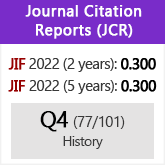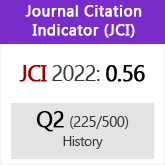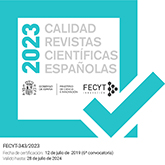Denouncing your Own Sin: the Struggle for Subjectivity through the Publicization of Penance in Spanish Convents
DOI:
https://doi.org/10.3989/chdj.2017.016Keywords:
Convents, Mortification, Subjectification, Dissimulation, InstitutionAbstract
This article delves into the creation of subjectivity through the publicization of penance in Spanish convents. We seek to demonstrate that conventual sociability relied on the disclosure of each nun’s interiority despite the discourse of self-denial the conventual institution was built upon. However, this presentation of the self was clearly restricted and had to fit within contradictory norms to deny and dispel any vain temptation to appear greater than the others. Nuns had to be humble, secret, moderate, strictly obedient, yet they were expected to edify one another, to be zealous and violent in their desire to mortify or castigate themselves. As introspection was a recommended activity, these double binds and the scruples they bred justify the systematic resort to tactics that relied on the leeway conventual life provided to work around the rule and seek recognition from the community. This necessary acknowledgment of each nun’s flaws and deeds fostered a common interpretation of what was the most appropriate behavior inside the convent. Therefore, subjectivity was jointly built through these self-disclosing techniques and the reaction of the community.
Downloads
References
Álvarez, Tomás (1995) Constituciones de las Carmelitas descalzas. Teresianum, Roma.
Alvira, María Isabel (1992) Vision de l'homme selon sainte Thérèse d'Avila, une philosophie de l'héroïsme. FX de Guibert, Paris. PMid:24194276
Ángeles, Juan de los (1998) Conquista del reino de Dios (1587). Edited by Martín, T.H. Biblioteca de Autores Cristianos, Madrid. PMid:9593072
Arias Montano, Benito (1990) Paráfrasis del Cantar de los Cantares de Salomón en tono pastoril. Diputación Provincial, Huelva.
Baranda Leturio, Nieves and Marín Pi-a, Carmen (editors) (2014) Letras en la celda. Cultura escrita de los conventos femeninos en la España moderna. UNED-Iberoamericana Vervuert, Madrid.
Baschet, Jérôme (2000) "Âme et corps dans l'Occident médiéval : une dualité dynamique, entre pluralité et dualisme". Archives de sciences sociales des religions, 112: 5-30. https://doi.org/10.4000/assr.20243
Bautista de Lanuza, Miguel (1654) Vida de la venerable Madre Feliciana de San Joseph, carmelita descalça y priora del convento de S. Joseph de Zaragoza. D. La Puyada, Saragosse.
Bautista de Lanuza, Miguel (1657) Virtudes de la V. M. Teresa de Jesús, carmelita descalza del convento de Valladolid. J. Lanaja y Lamarca, Saragosse.
Bautista de Lanuza, Miguel (1659) Fundacion y excelencias del Conuento de S. Ioseph de Carmelitas descalzas de Çaragoça. Pedro Lanaja y Lamarca, Saragosse.
Bedos-Rezak, Brigitte Miriam and Iogna-Prat, Dominique (editors) (2005) L'individu au Moyen Âge. Individuation et individualisation avant la modernité. Aubier, Paris.
Bergamo, Mino (1994) L'anatomie de l'âme: de François de Sales à Fénelon. J. Millon, Grenoble.
Bilinkoff, Jodi (2005) Related Lives: Confessors and their Female Penitents, 1450-1750. Cornell University Press, Ithaca.
Boulnois, Olivier (editor) (2007) Généalogies du sujet. De saint Anselme à Malebranche. Vrin, Paris.
Bouwsma, William J. (2000) The Waning of the Renaissance, 1550-1640. Yale University Press, New Haven. PMid:11128930
Butler, Judith (1997) The Psychic Life of Power. Theories in Subjection. Stanford University Press, Stanford.
Butler, Justin (2012) "Baroque Subjectivity and the Modern Fractured Self". (Re)reading Gracián in a Self-Made World. Hispanic Issues On Line Debates, 4: 6-28.
Carrasco Martínez, Adolfo (2003) "El estoicismo, una ética para la aristocracia del Barroco". In Calderón de la Barca y la España del Barroco, edited by Alcalá Zamora, J. and Belenguer, E. Centro de Estudios Constitucionales, Madrid: 305-330.
Carrera-Marcén, Elena (2005) Teresa of Ávila's Autobiography: Authority, Power and the Self in Mid-Sixteenth-Century Spain. Legenda, London.
Cascardi, Anthony (1992) "The Subject of Control". In Culture and Control in Counter-Reformation Spain, edited by Cruz, A.J. and Perry, M.E. University of Minnesota Press. Minneapolis. PMid:1599345
Cassirer, Ernest (1991) Individu et cosmos dans la philosophie de la Renaissance (1927). Minuit, Paris.
Cepeda-Adán, José (1988) Antropología de San Juan de la Cruz. Institución Gran Duque de Alba, Centro Internacional O.C.D. de Estudios Teresiano-Sanjuanistas, Ávila.
Certeau, Michel de (1990) L'invention du quotidien. 1. arts de faire (1980). Gallimard, Paris.
Crouzet, Denis (1990) Les guerriers de Dieu. La violence au temps des troubles de religion, vers 1525 - vers 1610. Champ Vallon, Paris.
Cruz, Anne J. (2004) "Willing desire: Luisa de Carvajal y Mendoza and Female Subjectivity". In Power and Gender in Renaissance Spain, edited by Nader, H. University of Illinois Press, Chicago: 177-193. PMid:12856199
Diem, Albrecht (2015) «L'espace, la grâce et la discipline dans les règles monastiques du haut Moyen Âge». In Enfermements II: Règles et dérèglements en milieu clos (VIe-XIXe siècle), edited by Heullant-Donat, I.; Claustre, J.; Lusset, É. and Bretschneider, F. PUF, Paris : 215-238. PMid:26361757 PMCid:PMC4567791
Douglas, Mary (1986) How Institutions Think. Syracuse University Press, Syracuse.
Douglas, Mary (1994) Risk and Blame, Essays in Cultural theory. Routledge, London-New York.
Esbarroya, Agustín de (1973) Purificador de la conciencia (1550). Universidad Pontifica de Salamanca and Fundación Universitaria Española, Madrid.
Estella, Diego de (1597) Primera parte del libro de la vanidad del mundo. Juan Gracián, Alcalá de Henares.
Fassin, Didier (2008) "The Humanitarian Politics of Testimony. Subjectification through Trauma in the Israeli-Palestinian Conflict." Cultural Anthropology, 23, 3 : 531-558. https://doi.org/10.1111/j.1548-1360.2008.00017.x
Foucault, Michel (2012) Du gouvernement des vivants. Cours au collège de France, 1979-1980. EHESS, Paris. PMCid:PMC3501081
Gabriel, Frédéric (2007) "Contemplation, anéantissement, récit. Les stratégies du sujet spirituel à l'âge moderne". Cahiers de philosophie politique et juridique de l'université de Caen. Dire le néant, 43: 179-209.
García-Arenal, Mercedes (2016) "De la duda a la incredulidad en la España moderna: algunas propuestas". In Identidades y fronteras culturales en el mundo ibérico en la Edad Moderna, edited by Betrán, J. L.; Hernández, B. and Moreno, D. Universitat Autònoma de Barcelona, Barcelona: 51-67.
García de Enterría, María Cruz (1990) "El cuerpo entre predicadores y copleros". In Le Corps dans la société espagnole des XVI et XVIIème, actes du colloque international, Sorbonne, 5-8 octobre 1988, edited by Redondo, A. Publications de la Sorbonne, Paris: 233-244.
Giordano, Maria Laura (2007) "Al borde del abismo: faslas santas e ilusas madrile-as en la vigilia de 1640". Historia social, 57: 75-97.
Goffman, Erving (2007) Asylums: Essays on the social situation and mental patients and other inmates (1961). Transaction Publishers, New Brunswick-London.
Granada, Luis de (1554) Libro de la oración y meditación. Andrea Portonariis, Salamanca.
Granada, Luis de (1596) Libro de san Ivan Climaco llamado escala espiritual. Juan Gracián, Alcalá de Henares.
Granada, Luis de (1996) Quarta parte del Símbolo de la Fe. Fundación Universitaria Española, Madrid.
Granada, Luis de (1997) Primer guía de peccadores. In Obras castellanas completas. Turner, Madrid.
Greenblatt, Stephen (1980) Renaissance Self-Fashioning. From More to Shakespeare. The University of Chicago Press, Chicago-London.
Guicciardini, Francesco (1953) "Relazione di Spagna". In Opere, edited by Caprariis, Vittorio de. Riccardo Ricciardi, Milan-Naples: 27-47.
Haliczer, Stephen (2002) Between Exaltation and Infamy, Female Mystics in the Golden Age of Spain. Oxford University Press, New York. https://doi.org/10.1093/0195148630.001.0001
Joly, Barthélémy (1909) "Voyage en Espagne de Barthélémy Joly (1603-1604)". Revue Hispanique, 20: 459-618.
Kagan, Richard (1991) "Politics, Prophecy and the Inquisition in Late Sixteenth Century Spain. In Cultural Encounters: the Impact of the Inquisition in Spain and the New World, edited by Perry, M.E. and Cruz, A.J. University of California Press, Berkeley.
Keitt, Andrew (2005) Inventing the Sacred. Imposture, Inquisition and the Boundaries of the Supernatural in Golden Age Spain. Brill, Leiden and Boston. PMid:15782441
Manero Sorolla, María del Pilar (1991) "Un diálogo de carmelitas primitivo traducido al francés: Pour l'instruction des novices de María de San José. In Traducción y adaptación cultural: España-Francia, edited by Donaire, M.L. and Lafarga, F. Universidad de Oviedo, Paris.
Maravall, José Antonio (1975) La Cultura del barroco. Análisis de una estructura histórica. Ariel, Barcelona.
Mariscal, George (1991) Contradictory Subjects: Quevedo, Cervantes and Seventeenth Century Culture. Cornell University Press, Ithaca and London. PMCid:PMC2272007
Marshall, Cynthia (2002) The Shattering of the Self: Violence, Subjectivity and Early Modern Texts. John Hopkins University Press, Baltimore and London.
Mújica, Bárbara (2004) Women Writers of Early Modern Spain: Sophia's Daughters. Yale University Press, New Haven.
Ordinario o ceremonial de las religiosas descalzas carmelitas conforme a las costumbres antiguas de su religion (1622). Viuda de Juan García, Alcalá de Henares
Platter, Thomas (2000) Le voyage de Thomas Platter. Fayard, Paris. PMid:10784185
Poutrin, Isabelle (1995) Le voile et la plume: autobiographie et sainteté féminine dans l'Espagne moderne. Casa de Velázquez, Madrid.
Quinsey, Katherine M. (2012) Under the Veil: Feminism and Spirituality in Post-Reformation England and Europe. Cambridge Scholars Publishing, Cambridge. PMCid:PMC3390355
Roccetti, Antonella. (1999) Antropologia teresiana: acercamiento humano a Teresa de Avila. Tesis Doctoral. Universidad de Oviedo, Oviedo.
Rodríguez de la Flor, Fernando (2005) Pasiones frías: secreto y disimulación en el barroco hispano. Marcial Pons, Madrid.
Roullet, Antoine (2013) ?Le savoir contemplatif: les religieuses et les limites de la connaissance (Espagne, XVIe siècle)". Revue Historique, 665: 119-143. https://doi.org/10.3917/rhis.131.0119
Roullet, Antoine (2015) Corps et pénitence, les carmélites déchaussées espagnoles, 1580-1640. Casa de Velázquez, Madrid.
Rubio, Diego (2016) "Di/simulación y fronteras religiosas en la temprana modernidad". In Identidades y fronteras culturales en el mundo ibérico en la Edad Moderna, edited by Betrán, J. L.; Hernández, B. and Moreno, D. Universitat Autònoma de Barcelona, Barcelona: 39-49. PMid:27753016
San Bartolomé, Ana de (1998) "Formación de novicias y ejercicios de piedad", in Obras completas. Monte Carmelo, Burgos.
San José, Feliciana de (1654) "Instrucción de religiosas con título de recreación espiritual". In Miguel Bautista de Lanuza, Vida de la venerable Madre Feliciana de San Joseph, carmelita descalça y priora del convento de S. Joseph de Zaragoza. D. La Puyada, Saragosse.
San José, María (1978) Instrucción de novicias (1602). Teresianum, Roma. PMid:711955
Sánchez Lora, José Luis (1988) Mujeres, conventos y formas de la religiosidad barroca. Fundación Universitaria Española, Madrid.
Sánchez, Francisco J. and Lewis, Tom (1999) Culture and the State in Spain, 1550-1850. Taylor and Francis, New York and London.
Santa María, Francisco de (1644-1655) Reforma de los Descalzos de Nuestra Se-ora del Carmen. Diego Diaz de la Carrera, Madrid.
Schlau, Stacey and Arenal, Electa (2006) «"Leyendo o y escribiendo ella": the Convent as Intellectual Community». Letras femeninas, 32, 1: 129-147.
Sluhovsky, Moshe (2007) Believe not Every Spirit: Possession, Mysticism, & Discernment in Early Modern Catholicism. University of Chicago Press, Chicago. https://doi.org/10.7208/chicago/9780226762951.001.0001
Sluzki, Carlos E. and Verón, Eliseo (1971) "The Double Bind as aUniversal Pathogenic Situation". Family Process, 10, 4: 397-410. https://doi.org/10.1111/j.1545-5300.1971.00397.x
Soto, Domingo de (1962) «?Tratado del amor de Dios" (1555)». In Tratados espirituales. Biblioteca de Autores Cristianos, Madrid. PMid:13884554
Spadaccini, Nicholas and Castillo, David R. (1994) "Models of Subjectivity in Early Modern Spain". Journal of Interdisciplinary Literary Studies, 6: 185-204.
Stallaert, Christine (1998) Ethnogenesis y ethnicidad: una aproximación histórico-anthropologica al casticismo. Proyecto A Ediciones, Barcelona. PMid:9669827
Taylor, Charles (1989) Sources of the Self: The Making of the Modern Identity. Harvard University Press, Cambridge, MA.
Teresa de Jesús (1997) Obras completas de Santa Teresa de Jesús. Biblioteca de Autores Cristianos, Madrid.
Unamuno, Miguel de (1996) En torno al casticismo (1895). Biblioteca Nueva, Madrid.
Venegas, Alejo de (2001) Agonía del tránsito de la muerte. L'Harmattan, Paris.
Vidal, Fernando (2006) Les sciences de l'âme, XVIe-XVIIe siècles. Honoré Vidal, Paris.
Weber, Alison (1990) Teresa of Avila and the rhetoric of femininity. Princeton University Press, Princeton.
Zarri, Gabriella (editor) (1991) Finzione e santità tra medioevo ed età moderna. Rosenberg & Sellier, Torino.
Published
How to Cite
Issue
Section
License
Copyright (c) 2017 Consejo Superior de Investigaciones Científicas (CSIC)

This work is licensed under a Creative Commons Attribution 4.0 International License.
© CSIC. Manuscripts published in both the printed and online versions of this Journal are the property of Consejo Superior de Investigaciones Científicas, and quoting this source is a requirement for any partial or full reproduction.All contents of this electronic edition, except where otherwise noted, are distributed under a “Creative Commons Attribution 4.0 International” (CC BY 4.0) License. You may read here the basic information and the legal text of the license. The indication of the CC BY 4.0 License must be expressly stated in this way when necessary.
Self-archiving in repositories, personal webpages or similar, of any version other than the published by the Editor, is not allowed.

















